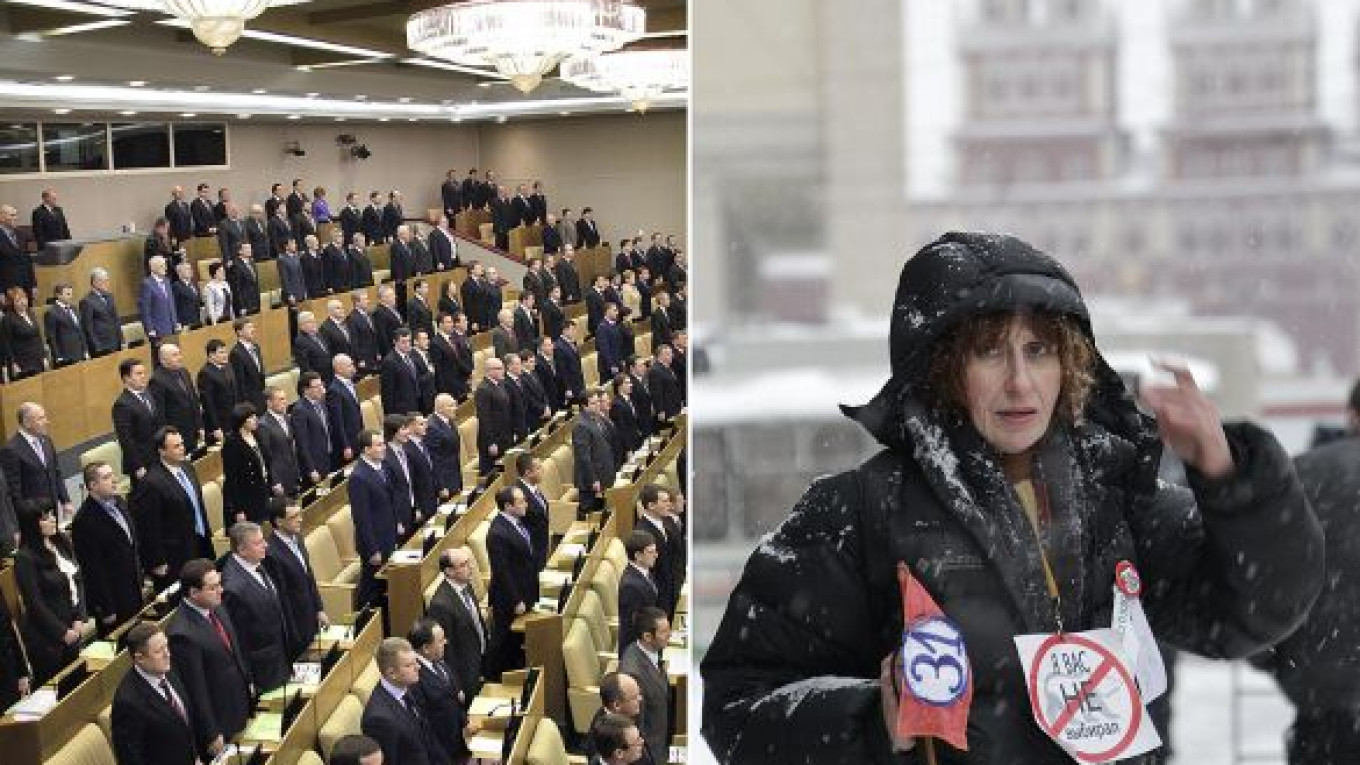With new Speaker Sergei Naryshkin promising to allow debate, the newly elected State Duma opened Wednesday with one of its most quarrelsome sessions in years — but United Russia still managed to dominate the proceedings.
Naryshkin, who resigned last week as Kremlin chief of staff, reiterated an earlier pledge at the opening of sixth Duma that parliament was a place for "solid and serious discussions."
"I support free parliamentary discussion. Only this can lead to compromise," said Naryshkin, a career bureaucrat and close ally of Prime Minister Vladimir Putin.
The previous speaker, Boris Gryzlov, is credited with saying the Duma is "not a place for discussion" in 2003. Although misinterpreted, the quote has become popular and believable, given that the Duma has turned into a meek institution over the past decade, rubber-stamping Kremlin decrees and proposals.
The Duma's lack of independence helped fuel a protest vote at Dec. 4 Duma elections, where United Russia won 49 percent and its presence in the lower house slipped from 315 to 238 seats, barely enough for a majority in the 450-seat legislature.
By tradition, the Duma's first plenary session is opened by the eldest lawmaker on the roster — who on Wednesday turned out to be Vladimir Dolgikh, 86, a former Politburo member who belongs to United Russia. He will be 91 when his term ends under a Kremlin-backed reform that extended the terms of the new deputies to five years from the previous four.
Senior deputies not affiliated with United Russia did not miss a chance to flaunt off their newfound confidence at the session Wednesday, repeatedly interrupting it with procedural complaints, RIA-Novosti reported.
Troublemakers included Just Russia's Gennady Gudkov and Alexei Mitrofanov and Liberal Democrat Vladimir Zhirinovsky, it said. Naryshkin, who has no prior parliamentary experience, politely listened to their remarks, making no attempt to interrupt them or deny them the floor.
The Communists, the Liberal Democrats and A Just Russia also fielded their own candidates for the speaker's seat but failed to prevent Naryshkin from taking the job.
The Communists, which placed second in the elections, scored a first deputy speaker post for Ivan Melnikov. There are two first deputy speakers, however, and the second post went to United Russia member Alexander Zhukov, a former deputy prime minister and old Duma hand.
The parties also distributed the top posts at the 29 parliamentary committees, 15 of which went to United Russia in an arrangement that was previously agreed on by all parties. The Communists got six committees, while A Just Russia and the Liberal Democratic Party got four each.
United Russia's losses included the Defense Committee, now headed by Communist Vladimir Komoyedov, a former Black Sea commander and an ardent critic of Prime Minister Vladimir Putin, head of United Russia.
Other significant appointments included United Russia's Andrei Makarov, a liberal-leaning attorney and a political insider who is now the head of the Budgetary Committee. Makarov is better known for his television job than involvement with finances, having hosted a show on privately owned Ren-TV.
Another television pundit, Alexei Pushkov, also a United Russia member, became the head of the International Affairs Committee. Pushkov gained a hawkish reputation on a weekly show on TV Center, although he also contributes to National Interest magazine, published by the Washington-based conservative Center for the National Interest.
Pushkov, an occasional contributor to The Moscow Times, is known for his controversial political views and has often accused European countries of exercising double standards in their criticism of Russia.
United Russia controlled 26 committees in the last Duma, which had a total of 32 committees.
Public discontent remains unquenched over United Russia and the Duma elections, with 30,000 to 60,000 people denouncing the vote as rigged at a Moscow rally on Dec. 10. A second rally is planned for this Saturday.
A series of one-person pickets — the only form of public protest that requires no permission from the authorities — was held near the Duma on Wednesday by activists protesting election fraud.
"The Russian people want change, and that change will come," A Just Russia leader Sergei Mironov said in televised comments Tuesday.
Yaroslav Nilov, a deputy with the Liberal Democratic Party, said United Russia has been taken down a notch.
"There is a feeling that United Russia feels more unsettled," Nilov said by telephone.
But in a sign that a rebellion in the Duma is far off, Nilov also said he expected the parliament to become "less tense" under Naryshkin, whom he called "more liberal" than his predecessor, Gryzlov, whose departure is seen as an attempt to pacify the protesters.
A Message from The Moscow Times:
Dear readers,
We are facing unprecedented challenges. Russia's Prosecutor General's Office has designated The Moscow Times as an "undesirable" organization, criminalizing our work and putting our staff at risk of prosecution. This follows our earlier unjust labeling as a "foreign agent."
These actions are direct attempts to silence independent journalism in Russia. The authorities claim our work "discredits the decisions of the Russian leadership." We see things differently: we strive to provide accurate, unbiased reporting on Russia.
We, the journalists of The Moscow Times, refuse to be silenced. But to continue our work, we need your help.
Your support, no matter how small, makes a world of difference. If you can, please support us monthly starting from just $2. It's quick to set up, and every contribution makes a significant impact.
By supporting The Moscow Times, you're defending open, independent journalism in the face of repression. Thank you for standing with us.
Remind me later.


